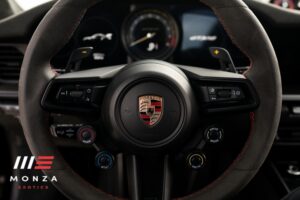Porsche’s history begins with its illustrious founder, Ferdinand Porsche, whose innovative vision and engineering expertise led to its establishment.
On April 25, 1931, Ferdinand Porsche, alongside his partners Adolf Rosenberger and Anton Piëch, founded “Dr. Ing. h.c. F. Porsche GmbH.” The original headquarters were located in the center of Stuttgart, on Kronenstraße.
Porsche’s name symbolizes a combination of technical innovation and traditional craftsmanship in the automotive industry. Over the decades, the marque has become synonymous with high-performance sports cars.
Starting with a design office, Porsche’s first major contribution to automotive history began in the early 1930s.
However, the genesis of the Porsche brand, as recognized today, took a definitive shape post-World War II with the introduction of the Porsche 356 in 1948.
Conceived in a humble garage in Gmund, Austria, the very first cars were hand-built. The 356 was a rear-engine, lightweight sports car that laid the foundation for Porsche’s design philosophy, blending functional elegance with dynamic performance.
As production ramped, Porsche established itself as a purveyor of performance-oriented vehicles that upheld an ethos of quality and excellence.
Over the years, Porsche has expanded its legacy by developing iconic models like the Porsche 911, introduced in 1963.
The 911 has evolved through various iterations, maintaining its signature rear-engine layout and silhouette that is instantly recognizable.
Porsche’s history is not just limited to road-going vehicles; the brand has also made significant strides in motorsports, with race cars like the 550 Spyder attesting to its competitive spirit.
The combination of performance, design, and innovation underpins Porsche’s reputation as a preeminent sports car manufacturer.
Origins and Founders
The origins of Porsche trace back to Austria with the visionary Ferdinand Porsche and his relentless ambition in the automotive industry. His legacy, carried forward by his family, firmly established Porsche as a distinguished brand in Stuttgart, Germany.
Early Beginnings in Austria
Ferdinand Porsche was born in 1875 in the North Bohemian village of Maffersdorf, then part of Austria-Hungary. His early career milestones included significant contributions to companies like Austro-Daimler, where he became involved in vehicle design and engineering.
His revolutionary ideas laid the groundwork for future automotive successes during this phase.
Ferdinand Porsche and Family Legacy
Porsche’s founding figure, Ferdinand Porsche, was an accomplished engineer known for designing the Volkswagen Beetle. His son, Ferry Porsche, played a critical role in the brand’s development, translating his father’s engineering prowess into commercial success.
The broader Porsche family, including Anton Piëch and his son Anton Porsche, played instrumental roles in shaping the company’s direction. Their collective expertise ensured that Porsche’s innovative spirit was passed down through the generations.
Establishment of Porsche in Stuttgart
In 1931, Dr. Ing. h. c. F. Porsche GmbH was founded by Ferdinand Porsche, Adolf Rosenberger, and Anton Piëch, with the main office located at Kronenstraße 24 in the center of Stuttgart.
Initially, the company did not build any cars under its brand. After World War II, specifically in 1948, in Gmünd, Austria, the first car to bear the Porsche name was created – the Porsche 356.
Following a brief stay in Austria, the company eventually settled down in Stuttgart, which remains the home of Porsche to this day.
Iconic Models and Engineering Milestones
Porsche’s legacy is shaped by its continuous innovation and the creation of hallmark models that have become benchmarks in the automotive industry. From pioneering sports cars to advanced supercars, Porsche has consistently set engineering milestones across decades.
The 356: Porsche’s First Production Automobile
The Porsche 356 is where it all began, marking Porsche’s foray as a manufacturer of sports cars. Introduced in 1948, this rear-wheel drive, rear-engine car was notable for its lightweight body and agile handling. It laid the groundwork for Porsche’s design ethos and engineering principles, which still resonate today.
Racing Heritage: The Influential 917 and 956
- Porsche 917: A legend on the racing circuit, the 917 was introduced in 1969 and quickly made an impact with its remarkable performance at endurance races, such as the 24 Hours of Le Mans.
- Porsche 956: Building on the racing pedigree, the 956, launched in the early 1980s, featured groundbreaking aerodynamic concepts like the integrated rear wing and became a dominant force in Group C racing.
The Evolution of Porsche 911
Since its inception in 1963, the Porsche 911 has continually evolved while maintaining the iconic silhouette that makes it instantly recognizable.
Notable models like the 911 Turbo introduced in 1974, with its distinct rear spoiler and the air-cooled engines until the late 1990s, are part of its rich heritage. The 911’s adaptability has ensured its place as a timeless sports car.
Advancements in Supercar Technology: 959 and Carrera GT
- Porsche 959: In the mid-1980s, Porsche unveiled the 959, a technological tour de force featuring an all-wheel-drive system and computer-controlled adaptive suspension, setting a new standard for high-performance sports cars.
- Carrera GT: Fast forward to the 2000s, and the Carrera GT impressed with its mid-engine layout, V10 power, and extensive use of carbon-fiber technology, offering a pure and exhilarating driving experience.
Transition to Modernity: Cayenne, Panamera, and Taycan
- Porsche Cayenne: Introduced in 2002, the Cayenne was Porsche’s first venture into the SUV segment, demonstrating that Porsche’s expertise in building high-performance vehicles could be applied to a family-oriented form factor.
- Porsche Panamera: Debuted in 2009, the Panamera took the concept of a high-performance luxury sedan and infused it with Porsche’s sports car DNA.
- Porsche Taycan: Looking towards the future, Porsche launched the Taycan, its first all-electric sports car, in 2019, signaling its commitment to innovation and the era of electric mobility.
Porsche and the Spirit of Competition
Porsche’s history in motorsports is decorated with significant wins in some of the world’s most challenging races, including the prestigious Le Mans and the Targa Florio. Their participation showcases a commitment to excellence and a persistent spirit of competition.
Victories at Le Mans and Targa Florio
Le Mans: Porsche’s legacy at Le Mans is illustrious, marked by unprecedented victories. The Porsche 911 GT1 ’98 was a milestone, which dominated the 1998 event with a one-two finish, securing Porsche’s 16th overall victory at this grueling 24-hour race.
This success is a testament to Porsche’s innovation, particularly through the integration of a carbon fiber chassis.
Targa Florio: In the realm of endurance racing, Porsche first triumphed at the Targa Florio in 1956. This victory was a significant achievement, occurring on the challenging mountain roads of Sicily, where driving skill and vehicle reliability were crucial.
Over the years, Porsche continued to succeed at Targa Florio, reinforcing their reputation for building indefatigable sports cars.
Porsche’s Endeavors in American Le Mans Series
Porsche entered the American Le Mans Series (ALMS) in 2005 with the RS Spyder sports prototype. The RS Spyder was notably agile, demonstrating Porsche’s engineering prowess on the tracks of North America.
Its participation and achievements in ALMS highlighted Porsche’s dedication to motorsports across various platforms and its unwavering resolve to compete at the highest levels of racing.
Technological Innovations and Industry Influence
Porsche’s history in technological innovations is marked by pioneering air-cooled engines, embracing hybrid and electric vehicle technology, and consistently influencing the automotive world.
Their innovations have consistently aimed to improve performance, reduce fuel consumption and emissions, and enhance the driving experience.
From Air-Cooled to Water-Cooled Engines
Porsche significantly transitioned in the late 1990s from using air-cooled to water-cooled engines.
The air-cooled engines, a hallmark of Porsche cars like the classic 911, were revered for their simplicity and distinct sound.
However, Porsche recognized the need for change to meet stricter emissions standards and to increase power and reliability.
In 1998, the Porsche 911 model 996 was introduced with a water-cooled engine, resulting in a more efficient and powerful vehicle that retained the essence of its predecessors.
- Key Innovations:
- Introduction of water-cooled engines in 1998 with 911 model 996
- Improved fuel efficiency and compliance with emissions regulations
Development of Hybrid and Electric Vehicles
Porsche has been at the forefront of developing performance-oriented hybrid and electric vehicles.
This includes models such as the Cayenne S Hybrid, introduced as Porsche’s first hybrid model, and later the Panamera S E-Hybrid, combining traditional combustion engines with electric motors.
The pivotal point came with the launch of the Porsche Taycan, their first all-electric sports car, representing a significant step in embracing electric mobility without compromising performance.
Porsche’s commitment to electrification signifies a broader industry trend towards sustainable, high-performance vehicles.
- Electric Innovations:
- Launch of the all-electric Porsche Taycan
- Integration of hybrid technology in models like the Cayenne S Hybrid and Panamera S E-Hybrid
Porsche in the Automotive World and Beyond
Porsche has cemented its role in influencing the automotive industry. They do this through continuous technological advancements and a distinctive car design and performance approach.
Their vehicles often feature all-wheel drive systems. These have enhanced driving dynamics and customer appeal, particularly in the 911 Carrera 4 models and SUVs like the Cayenne.
The brand also emphasizes reducing fuel consumption and CO₂ emissions. They do this without sacrificing the quintessential Porsche driving experience.
Porsche reshapes the standards for sports cars and luxury vehicles through consistent innovation.
- Performance & Environmental Focus:
- Integration of all-wheel drive in models, enhancing performance and safety
- Dedication to reducing vehicle emissions and fuel consumption

